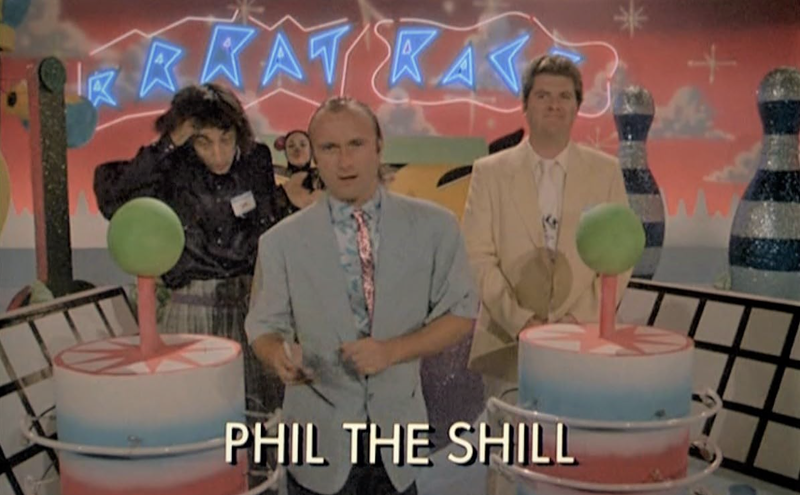"I mean, they weren't very good," he says. "'Year of the Cat' wasn't bad, but the others were pretty rank. 'Year of the Cat' would be about 50th on my list of [favorite songs I've written], and 'Time Passages' would be 'round about 110th. Apart from the fact they bring in cash, they're almost completely irrelevant to my life. And they're largely irrelevant to the lives of the people who come to my shows [now]."
But Al Stewart cannot completely escape "Year of the Cat." He still includes the song that made him semifamous in his present club repertoire -- albeit in a stripped-down acoustic form. The larger meaning of its hitdom, however, continues to elude him. "A lot of the other songs [on the Year of the Cat album] were a lot better written, and in a perfect world, or even in a caring world, they would have been the hits. But, as I would be the first to realize, lyric writing is a quarter of a hundredth of a thousandth of a percent of what people are interested in when they buy a record, which is sad. But it does explain why 'My Ding-a-Ling' was Chuck Berry's biggest hit. Actually I think that's a perfect parallel. 'My Ding-a-Ling' is about as relevant to Chuck Berry's oeuvre as 'Year of the Cat' is to mine. How does that encapsulate it for you?"
Today the 50-year-old Stewart lives in Southern California and, in vintage Seventies style, writes concept albums. But things are little different now. His latest, Between the Wars, is a relaxed, mostly acoustic song cycle centered on the two-decade interval between the world wars. Name-checking Zelda Fitzgerald, Somerset Maugham, Bix Beiderbecke, and Joseph Stalin, the album packs a considerable historical punch; Stewart likens it to the aural equivalent of an A&E documentary. But Stewart is no stranger to history. Since 1973's Past, Present, and Future (which contained the moderate hit single "Nostradamus," a catchy ode to the French seer), a fondness for themes historical has been as consistent a part of his work as his distinctive whispery tenor.
Stewart began his music career riding the same wave as a host of like-minded late-Sixties British electric folkies and was most notorious in England for his 1969 album Love Chronicles. The curious eighteen-minute title track, a wordy ("Proust-like" is the term his P.R. folks prefer) journey through young Al's romantic career, climaxed with this unlikely and then-controversial couplet: "And where I'd thought that just plucking/the fruits of the bed was enough/It grew to be less like fucking/and more like making love."
"It's not a good piece of writing," Stewart admits now, laughing. "It's an incredibly tortuous rhyme. I'm sure I could have done better, but what the hell. I was about 22 or something."
For better or worse, Stewart dropped out of the crowded confessional school of songwriting after a few years and began to turn elsewhere A particularly world history A for inspiration. A partnership with producer Alan Parsons began with the 1975 album Modern Times and continued through Year of the Cat and Time Passages A and "all those saxophone ballads," as Stewart says dismissively. In the Eighties, though, the hits stopped coming. Which was fine by Al, apparently.
"Once that little period was over and the people who had liked those records had gone away -- and I'd gone back to playing clubs again, which was what I was doing before -- that whole part of my life went away," he says. "And by and large I don't have anything to do with it."
Between the Wars is Stewart's fifteenth album and his third for the independent Mesa/Blue Moon label. It is the first, however, that Stewart has crafted around a single historical era. "I do tons of historical songs, but this was a new period for me," he explains. "It was an intellectual exercise, really. I was curious to see what I really knew about the interwar period. As it turns out, I had quite a few ideas about it."
Recorded with the multi-instrumental assistance of former Wings guitarist Laurence Juber (who also produced and arranged the album), Between the Wars takes its musical cues from Stewart's old Django Reinhardt record collection, skipping adroitly through various swinging styles of acoustic pop and jazz as it traces the two decades' highlights and lowlights. Stewart manages to cover a host of major world events, in his distinctive low-impact fashion, from "Lindy Comes to Town" and its evocation of Lindbergh-era Roaring Twenties idealism to "Always the Cause," a castanet-spiked tale of the Spanish Civil War.
It is a deceptively jaunty-sounding affair, in part because of Stewart's wry, literate takes on the geopolitics of the time. He manages to construct a nifty pop tune about Woodrow Wilson's ill-starred League of Nations ("League of Notions"), and a take on Stalin's purges of the Bolsheviks in "Joe the Georgian," an allegory that portrays, as Stewart says, "all the dead Bolsheviks in Hell, waiting for Stalin so they can torture him for all eternity." But there's a distinctly rueful air about much of the album, especially during the Thirties tunes, such as "Marion the Chatelaine" (a delicate acoustic bio of Marion Davies, William Randolph Hearst's luckless mistress) and the eerie dancing-on-the-brink-of-war "Laughing into 1939." And despite Stewart and Juber's artful six-string homage to the jazz-fueled sound of the times, Between the Wars is ultimately a bit of a downer. After all, everyone already knows how it all ends. Stewart chooses to finish with "The Black Danube," a subdued guitar instrumental with a vaguely forbidding Teutonic air, a wordless hint of things to come.
"It's not nostalgic in the least," Stewart admits. "I certainly think that these 21 [1918 to 1939] years are really pretty dreadful. Basically, nothing between 1929 and 1945 is anything you could say anything good about. There were eight different dictatorships in Europe, total depression in the United States of America. There was a war in Manchuria, there was the Stalinist repression in Russia. And, coincidentally, the longest period without a decent harvest in the history of Bordeaux." (Among his other arcane pursuits, Stewart is a decorated French-wine expert.) "It's a factoid I didn't use on the record, but it seemed like nature and man were in a conspiracy to screw up the planet."
As a dispassionate student of history, Stewart has an unusually clear-eyed appraisal of his own time and place, particularly his difficulties in maintaining a viable career in music. "The records I make now -- nobody's making any money out of them, including me," he says. "They're really sort of labors of love. I've said after every album that it's incredibly unlikely that I'll make another one. There is a point at which you basically don't have enough money to make a record. I'm not sure I can make a cheaper record than Between the Wars."
But there are still eras left unexplored, if time and finances permit, and Stewart's ever-shrinking fan base certainly hasn't cramped the sweep of his ambitions. "In a perfect world there are any number of things I'd like to do," he says. "I'd like to make an entire two-hour song cycle of the 6000 years of civilization since Sumeria, for example; there are many, many different bits I haven't tackled. It would make a fantastic album, in my terms, and the 5000-odd people who buy my records would absolutely adore it. However, there is certainly no record company in the world that would give me the money to do it, and unless some philanthropic organization antes up the bucks, it will never be done."
He admits, though, that the chances of scoring a struggling-singer-songwriter grant are slim. "If I were writing an opera, even if I were writing an incredibly bad opera, I would be more likely to get a grant than if I were writing a popular song cycle," he notes bitterly. "Or unpopular, as the case may be."
Unlike many of his contemporaries, Stewart hasn't been out flogging his past hits on big Monsters of the Seventies package tours or trying to capitalize on the latest spasm of nostalgia for the decade that briefly brought him fame. "I have a completely virgin record in terms of exploitation," he points out. But that is not necessarily by design. Potential exploiters, take note: "You can only cash in on what's offered to you," Stewart explains. "Far from cashing in, in my entire 30 years [in the music business] I've never been offered a chance to. It's not that me and Neil Young are extremely conscientious about this, it's just that I've never been tempted. If Lincoln-Mercury wanted to give me a million bucks to use 'Year of the Cat,' I'd say great."
In the end, it seems, even Al Stewart is a prisoner of his own history. "But don't think I'm complaining," he quickly adds. "The fact that I've managed to support myself extremely well for 30 years by writing these obscure things is mind-boggling. I mean, I can't sing; I can't play very well; whether I can even really write songs very well is open to debate. But, you know, it's been a very festive 30 years."
Al Stewart performs at 8:30 tonight, October 12, at Musicians Exchange Cafe, 729 W Sunrise Blvd, Ft Lauderdale; 944-2627. Tickets cost $17.












